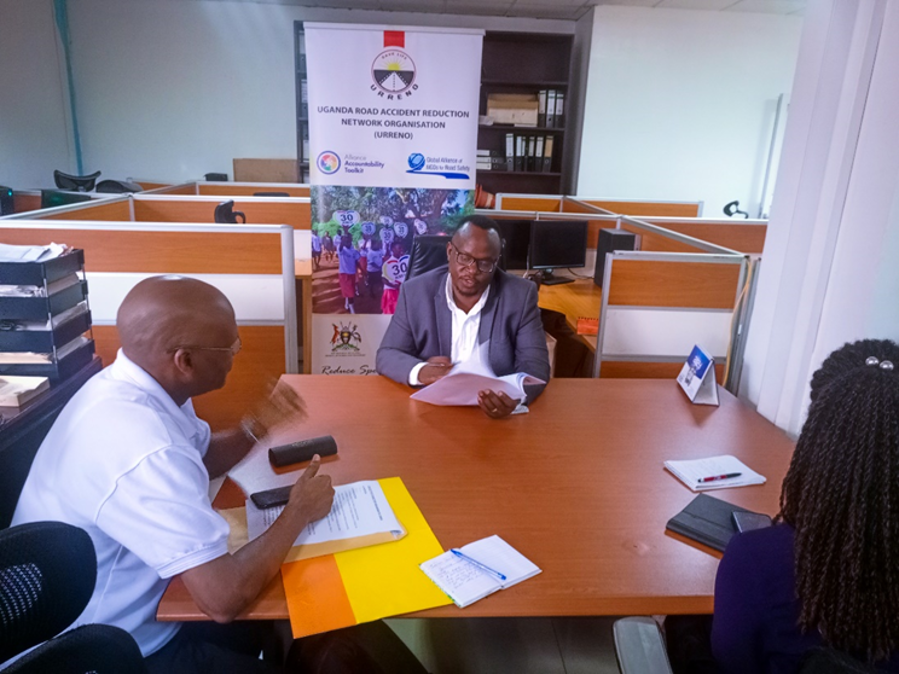
Through the Alliance Incubator, Alliance member URRENO has contributed to meaningful progress toward safe urban speeds in Uganda by supporting the transformation of policy commitments into concrete government action. Guiding its advocacy using the Alliance Accountability Toolkit (Toolkit), URRENO contributed to the process for the national gazetting of 30 km/h zones and is now advocating for strong enforcement and monitoring systems to ensure these protections reach communities, especially schoolchildren.
Identifying the gaps
URRENO began by assessing Uganda’s national laws and speed policy framework using the Toolkit’s Accountability Checklist. It found that pedestrians make up 33% of road deaths, yet enforcement of safe speeds remained weak despite plans for 30 km/h speed limits in the National Road Safety Action Plan (2022–2026) and the Traffic and Road Safety (Prescription of Speed Limits) Regulations 2024 (2024 Regulations). While these documents already allowed 30 km/h limits in high-risk zones, implementation, enforcement, and monitoring mechanisms were required.
“The evidence was already there, in the data, in the policies, and in the community. What we did with our findings was to bring it all together and make sure the government could no longer look away from implementation.” — Fred Tumwine, URRENO.
Building strategic partnerships and mobilizing allies
URRENO also mapped key decision-makers and found that they were already connected to the right government offices, including the Ministry of Works and Transport, Uganda National Roads Authority (UNRA), and Kampala Capital City Authority (KCCA). It further identified civil society allies including Road Safety Advocacy Coalition Uganda (ROSACU), Safe Transport and Survivors Support Uganda (STASSU), Global Health Advocacy Incubator (GHAI), Centre for Policy Analysis (CEPA), and the Global Health Advocacy Incubator (GHAI). These allies supported URRENO with technical guidance, community reach, and policy expertise to strengthen the advocacy.
Turning evidence into clear policy asks directed at the government
With this foundation, URRENO used the Priority Interventions and Government To Do List in the Toolkit to define key asks: gazette 30 km/h zones nationally, set a budget and timeline for implementation starting with school zones, and establish a monitoring framework to ensure compliance. These were presented in meetings and a multi-agency roundtable with the Ministry of Works and Transport, UNRA, and KCCA. URRENO drew on the NGO Talking Points to make the case for 30 km/h zone implementation, emphasizing the preventable loss of life and the need to translate existing regulations into action.
Tracking results and sustaining momentum from commitments to national action
URRENO is tracking the outcomes of its advocacy using the Accountability Tracker. Uganda has now gazetted 30 km/h zones in January 2025 and launched the Guide for Establishment of Safe School Zones in May 2025, including updated regulations to reduce default urban limits from 50 km/h to 30 km/h. URRENO is also extending its advocacy toward the establishment of a national monitoring and evaluation framework and strong enforcement, especially in school zones, by raising police awareness of the newly gazetted regulations and leading community campaigns to help the public understand the benefits of 30 km/h limits.
“I recommend that those who have not had the chance to use the Accountability Toolkit should use it. It is very resourceful. It brings out the evidence-based facts, and it tells you what to ask the government. I was impressed. It points out all the issues you need to consider such as the presence of a coordinating body for road safety, monitoring and evaluation, and so on. Every organization should be exposed to this tool.” — Fred Tumwine, URRENO.
Read the Incubator case study here.